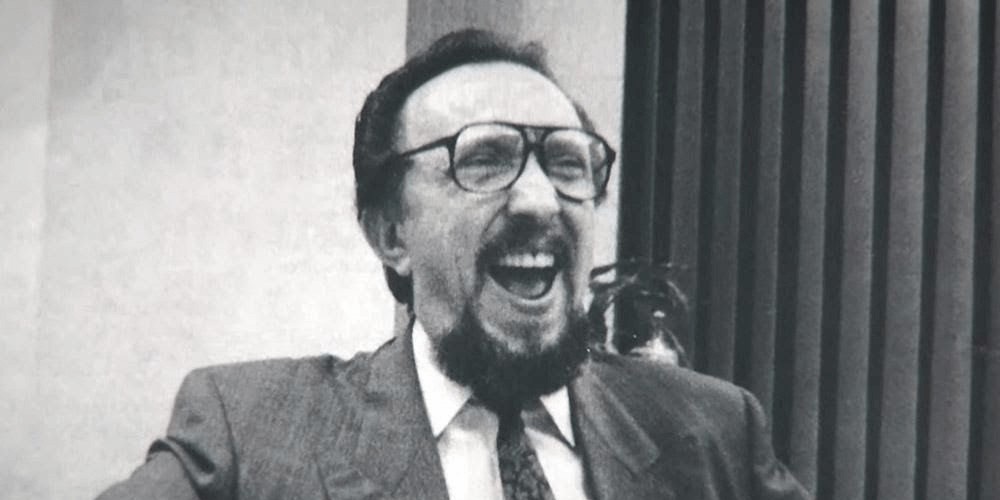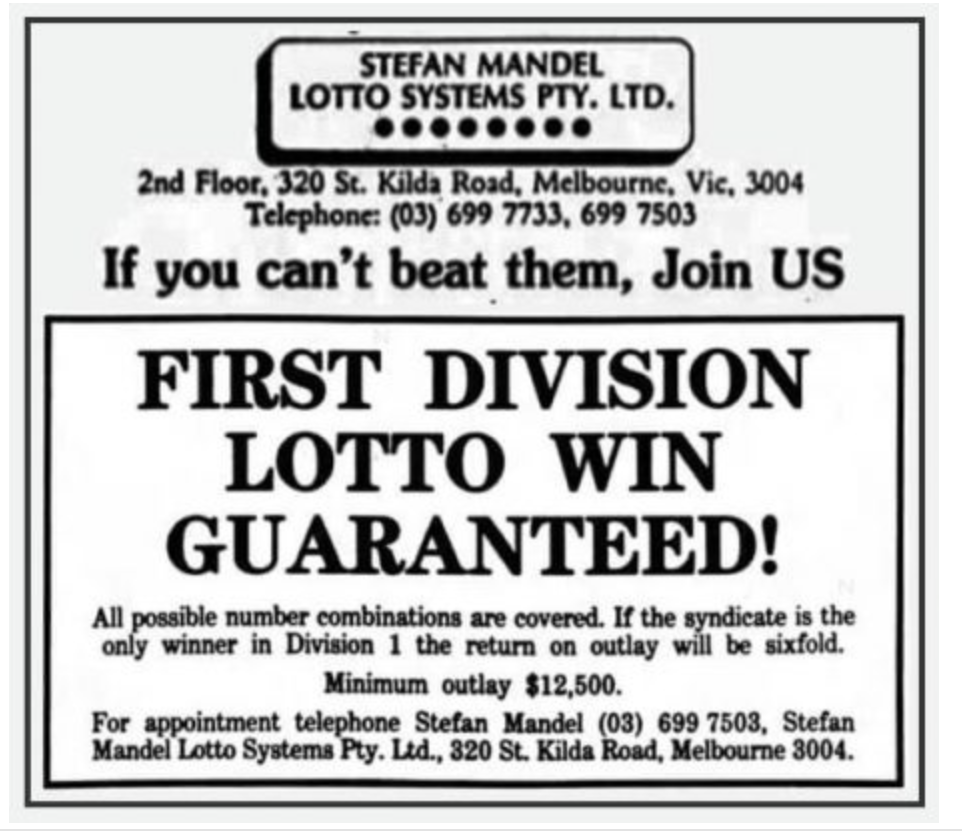The true story of Stefan Mandel, a Romanian mathemetician who, without cheating, won 14 lottery Jackpots across multiple countries.

One of the most enjoyable idle conversations is imagining how you’d spend a lottery win. This reflects how modern lotteries market the dream of bagging a life-changing Jackpot. However, the reality of lotteries is much more clinical; they’re designed to make a guaranteed profit for the organisers, except in very rare circumstances when the odds are theoretically in your favour. Stefan Mandel, a Romanian economist, is one of the few people to put that theory into practice.
Using a mixture of maths, logistics and an appreciation of small sprint, Mandel won a record 14 Jackpots across multiple countries in the 1980s and 90s to earn legendary status as the King of lotteries. This is his story.
Spoiler alert – There are no lottery hacks
Before we get into the amazing true story of how Stefan Mandel took on the lotteries and won, you should know that this article doesn’t contain a secret hack that will land you a lottery Jackpot.
There is no such thing as a free lunch, so the mathematics of Lotteries cannot be gamed, no matter what messages in your Spam folder might tell you.
No loss lotteries are just a variation on Prize Linked Savings, but on rare occasions, traditional lotteries present a window of opportunity.
Let’s take the UK National Lottery as an example. Entrants choose six numbers from 1 to 59 and pay £2 to enter.
The odds of a single entry matching the randomly drawn winning sequence is 1 in 45 million. To put that into perspective, the US National Weather Service calculates the odds of being struck by lightning in a given year as 1 in 1,222,000. So you’re 37 times more likely to be struck by a lightning bolt than win the UK National Lottery. The focus on lottery winners is just the product of survivorship bias.
You’re 37 times more likely to be struck by a lightning bolt than win the UK National Lottery
Data from US National Weather Service
And it isn’t just that winning is so unimaginably unlikely; when viewed from a pure gambling proposition’s perspective, lotteries represent poor value.
For every £2 staked on the UK National Lottery, you will, on average, get just 95p back. In other words, you would lose money if you bought 45 million tickets to cover every possible combination – ignoring the terms and conditions and logistical challenges. This is what is known as negative expected value.
It sounds absurd, but you may as well hand over the £1.05p and not bother filling in your ticket. This is why the lottery is considered an indirect tax.
Now here comes the but…without which there would be no story.
When it makes sense to buy a lottery ticket
Lotteries don’t guarantee to produce a winner for each draw. This might be because they don’t sell enough tickets to cover all combinations or because entries are skewed by our bias towards systems for picking numbers, like using birthdays.
When there is no winner, the Jackpot rolls over to the next draw and is, therefore, much bigger. In rare circumstances, that combined rollover is big enough to turn the expected value positive.
On January 9th, 2016, the expected value of the UK National Lottery turned positive for the first time in its history. In other words, you could guarantee to make a lot of money if you could cover every possible entry combination.
This trick isn’t some trade secret; Jacobi Bernoulli discovered the maths behind this in the 17th century. But taking advantage of this edge required Oceans 11-type skill and balls, which is exactly what Stefan Mandel had in spades.
Stefan Mandel’s dream of escaping communist Romania
Stefan Mandel was born in Romania in 1934 as the country suffered the consequences of the Great Depression. Having allied with the Nazis in WW2, Romania became part of the Soviet Union following Hitler’s defeat, so the depravations of Communism defined Mandel’s early life.
An accountant by profession, by 1960, Mandel had a wife and two kids that he struggled to support on a meagre salary of 360 lei (the equivalent today of around €68 or £60). Dreaming of a better life, Mandel determined to use his grasp of mathematics and fascination with lotteries as a route out.
Mandel studied the Romanian lottery and calculated that by covering five numbers out of six and timing the draws, he could reduce the required combinations from millions down to thousands.
As he later admitted, this still left the outcome down to luck, but favour shone down on the investors he had gathered to raise 78,783 lei (around €16,000).
His syndicate scooped the first prize (the first of many), enabling Mandel to bribe Communist officials and buy his way out of the country.
Mandel’s multiple lottery wins in Australia
After travelling around Europe for several years, Mandel settled in Australia, where he soon set about repeating his success, helped by desktop computing.
He ran newspaper ads to pull together a syndicate to raise money, illustrating that his strategy was very much out in the open. He even directly contacted lottery organisers to confirm their rules.

With the funds at his disposal, he created a boiler room to print tickets for the lotteries that his system targeted as profitable, net of the tax on winnings. Mandel’s syndicate eventually won 12 jackpots, including one of $1.1million in Sydney in 1986.
Mandel’s success earned him status as a minor celebrity and the attention of the lottery organisers, who tried changing the rules to thwart his tactics. But for every tweak of the regulations, Mandel found a loophole.
When syndicates were banned, he created a company to legally enter en-masse and offered what he described as a ‘savings plan’ for clients. Tattslotto, who ran Australian lotteries, feared Mandel would corner the market. ‘That wouldn’t be fair’, said the Group’s Chief Executive in August 1989, which is ironic given the poor value lotteries offer actually offer in terms of expected value.
Mandel eventually realised he couldn’t stay ahead of the cat-and-mouse regulatory game forever in Australia. Luckily, his status as a Lottery specialist hadn’t reached America, where he now turned his attention.
Not all lotteries are profitable from the player’s point of view. But the one in Sydney gave me the opportunity to invest 7 million dollars and earn 27 million.
Stefan Mandel
The Virginia lottery, Mandel’s biggest Jackpot
Mandel’s research of the lottery landscape in America seems to have first focused on the Arizona Lottery, where newspaper reports suggested Circle K had been contacted about the possibility of buying $2 million worth of tickets.
That enquiry went nowhere, and his International Lottery Fund turned its attention to Virginia for two main reasons:
- Entries were selected from 1-44 so the maximum number of combinations was only 7.1 million
- Virginia allowed entries to be printed at home
Given Mandel’s experience of winning multiple lotteries in Australia, and even smaller lotteries in the UK, he knew that the Virginia Lottery represented the perfect opportunity; he just had to raise the money from 2,500 investors.
Though Mandel claimed no involvement the Melbourne Sunday Herald Sun reported that $7.2 million in funding was traced from an Australian Investment Fund called the International Lottery Fund, to the Bank of Boston. set up his ticket printing operation and wait for a big enough rollover.
The stars aligned in February 1992 when the Jackpot grew to $27million, representing a potential x3 return on the maximum outlay.
According to the Virginia Daily Press Anithalee S.Alex Jnr, owner of an oil company, used cashier checks to buy 5 million tickets through restaurant and grocery chains, but the local lottery stores ran out of slips leaving the syndicate 2.1 million entries short, covering only 78% of total tickets.
Rather than having all the bases covered, Mandel and his team had a 22% chance of missing out on the Jackpot, so were now waiting nervously for the result.
How the Virginia lottery was a hard-fought win for Mandel
They needn’t have worried as on February 14th, 1992, Mandel’s syndicate picked up the Jackpot for the numbers 8 – 11 – 13 – 15 – 19 – 20 for a ticket bought from No.168 Fresh Farm Supermarket in Chesapeake.
The syndicate also scooped around $900,000 in consolation prizes, taking the overall haul to close to $30 million.
Mandel, 51 at the time, had distanced himself from the enterprise and was reportedly camping in Europe, so was unavailable for comment. It was left to the syndicate’s representatives in the USA to collect, making full use of the six-month period to collect, but even then, it was far from a straight road.
Mandel faced four long years of legal challenges involving 14 agencies from different countries, including the CIA, the FBI and Australian authorities.
Ultimately, the courts found that Mandel had no case to answer, and he was paid the winnings minus taxes.
This wasn’t to be his last brush with the law. He later spent four years in Israel, involved in other unusual investment ideas, one of which landed him in court and a 20-month sentence.
That verdict was handed down in absentia as Mandel was off again on his travels. The sentence was later quashed, and Mandel reportedly settled in Vanuatu, living out his retirement and shying away from his legacy.
Stefan Mandel’s Legacy
What Mandel’s ingenuity had achieved, other than financial gain, was, in a sense, counter-productive. He forced lotteries to change how they operate by lengthening the odds and, therefore, the number of required entries to cover every combination or outright banning the tactic altogether. This made it almost impossible for others to follow in his footsteps.
In the only major interview Mandel gave, he admitted: “I have always been accused by those close to me of being a dreamer”. Ironically, by achieving his dream and proving his many doubters wrong, he showed that despite their marketing, lotteries aren’t about making dreams come true. They’re about generating revenue, and Mandel was simply a thorn in their side.
And if the reality of how lotteries operate comes as a surprise, wait until you read about how bookmakers and casinos shut down professional sports bettors and card counters who, like Mandel, employ entirely legal means to gain an edge.
Stefan Mandel will always be remembered for devising a winning lottery system, but he was clear that the maths involved was elementary.
Instead, the self-professed philosopher-mathematician should be celebrated for his supreme organisational skills, the determination to exploit a weakness in the lottery model and the bravery to follow his dream.
Sources:
Richmond Times Feb 28th, 1992
Daily Press, Feb 29, 1992
The Age, Aug 11th, 1989
Stefan Mandel was a Romanian mathematician famous for winning 14 national lotteries by identifying positive expected value rollover situations.
Mandel’s syndicate is alleged to have won close to $30 million in the Virginia State Lottery draw on February 14th, 1992.
No Free Lunch
There is no such thing as a free lunch, but if you’re hungry to find out why, we’re here to help.
You can learn the meaning and origin of the no free lunch concept, as well as the broader philosophy behind the idea that nothing can ever be regarded as free.
We look at our relationship with money and truth, examining all of the supposed shortcuts, life hacks and get-rich-quick schemes.

2 comments
Comments are closed.